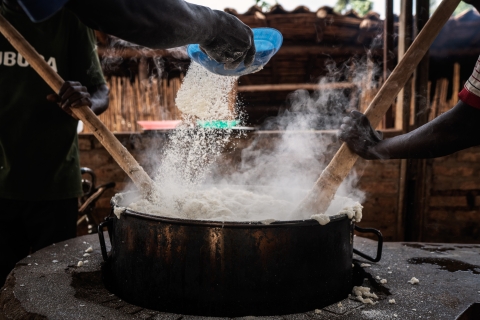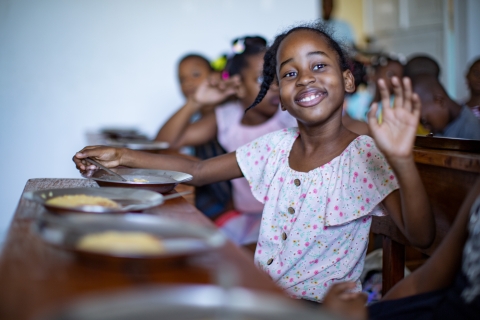Fragility to strength: World Education Day spotlights transformative school meal initiatives in conflict-affected countries
In regions affected by conflict and climate disasters, school meals play a crucial role. That is why, this World Education Day, the SUN Movement shines a light on practical initiatives led by the fragile and conflict-affected states (FCAS) nations within its Convergence Hub. These efforts not only address hunger and malnutrition but also contribute to building resilience in the face of adversity.
In the intricate landscape of challenges of the Convergence Hub countries, governments in Burundi, Central African Republic, Congo, Haiti, Tajikistan, Somalia, and South Sudan have adopted National School Feeding Strategies. They have also joined forces in the School Meals Coalition, emphasizing a collective commitment to reshaping the narrative through the combined power of education and nourishment.
Diving into the heart of these commitments:
- With the nationalization of its school feeding programme, Tajikistan has set the ambitious goal to achieve 50% school meals coverage for primary school students by 2027, with a commitment to upgrade, renovate, and technologically restructure school canteens for 100% coverage. Collaborating with the Ministry of Health, Ministry of Education, and the World Food Programme (WFP), with financial aid from the Russian Federation, the initiative has been pivotal, fostering public-private partnerships and supporting local food systems.
The nation is also building sustainable markets for local agricultural products, fostering enduring links between producers and school catering establishments.
Image
- With the government recognizing their importance at the highest level, thanks to the stewardship of the First Lady, H.E. Mrs. Angéline Ndayishimiye, Burundi exemplifies a strong commitment to nutritious school meals. The objective is to achieve universal coverage of school feeding by 2032 while introducing products with very high nutritional value such as fortified whole grain flour and milk. The country school feeding programme has already registered improved school retention and learning, also thanks to the efforts made by local communities actively participating in meal preparation and distribution, fostering a balanced nutritional approach through the inclusion of vegetables and fruits from school gardens.
- In Afghanistan, school meals are not limited to supporting the development of children, they empower entire communities. With the support of UN Nutrition, including the Food and Agriculture Organization (FAO), WFP, and the European Union (EU), local soybean farmers are not just preparing nutritious school meals - they are boosting food production and fostering income generation opportunities for vulnerable Afghans.
- Advocating for the seamless integration of the school feeding programme into government plans, Somalia has established a multisectoral coordination mechanism. Engaging new partners, especially from the private sector, the nation strives to elevate local and national awareness about the transformative impact of school meals.
Image
- In Haiti, the school feeding programme delivers comprehensive nutritional support, addressing health, sanitation, and climate change head-on. The new school feeding policy features a new chapter dedicated to nutrition. Through strategic partnerships with the Inter-American Development Bank and the Global Partnership for Education's Multiplier Fund, the government aims to expand coverage by 20%, reaching 1.5 million children. Plans for a groundbreaking technical agricultural college are also in motion, serving as a hub for continuity of learning. This is in line with the Ministry of Education’s policy to reach 100 percent local procurement for school meals by 2030.
As we celebrate World Education Day, let's applaud these transformative school meal initiatives led by nations in fragile and conflict-affected states, symbolizing resilience, community-strengthening, and environmental consciousness in the face of adversity. These countries are not just providing meals; they are building bridges to a brighter future for children navigating the complexities of fragility and conflict.